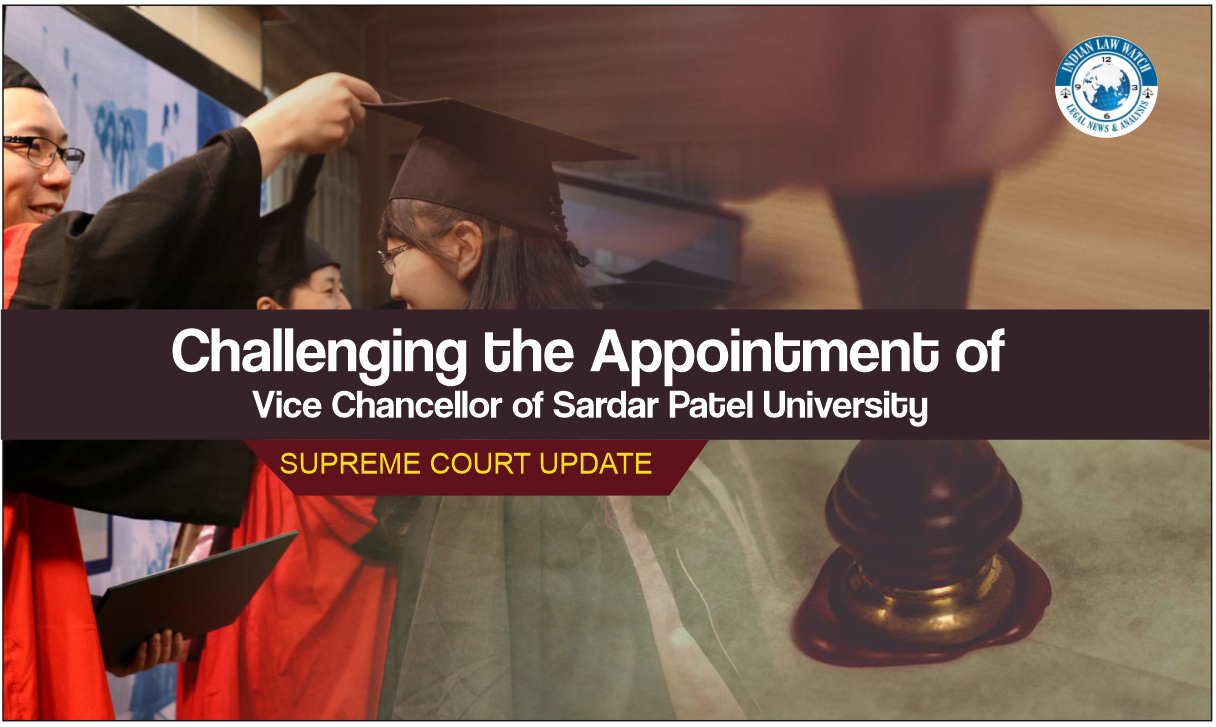

The Supreme Court on 3 March 2022 held that the Universities in Gujarat are bound by the UGC Regulations 2010 (Superseded by UGC Regulations 2018) since the state adopted the UGC Scheme and implemented the same.
Gambhirdan K Gadhvi v. The State of Gujarat

Regulation 7.3.0 of UGC regulations prescribes the eligibility criteria for the post of VC, where the person shall have 10 years of work experience as a professor in the University system and, further, that a Search Committee should be constituted consisting of a nominee of the Visitor/Chancellor, a nominee of the Chairman of UGC, a nominee of Syndicate/Executive Council of the University.
The petitioner, an ex-employee of the Sardar Patel University (“SPU”), filed a quo warranto writ petition under Article 32 against the appointment of Respondent No.4 (“R4”) as the Vice-Chancellor (“VC”) of the SPU (Respondent No.2).
SPU constituted a search committee as per Article Section 10(2)(b) of the SPU Act, 1955, and also issued an advertisement inviting applications for the post of VC mentioning the eligibility criteria prescribed by the said search committee. Thereafter, R4 was appointed as the VC of the SPU. R4 was acting as the VC for the second term and has been receiving the fixed pay of Rs.75,000/ as prescribed under the regulations.
The said appointment was challenged through a Special Civil Application (SCA) in the first term of R4 by the petitioner in front of a division bench of the High Court. The court dismissed the SCA by noting that Section 10 of the SPU Act does not prescribe any eligibility criteria for the appointment and hence the concerned appointment is legal. Further, the bench also noted that Gujrat has not adopted the UGC Regulations. However, the High Court ordered the State of Gujarat to implement the UGC regulations in the state to avoid such controversies in future. The petitioner then approached the SC with the Special Leave Petition, which was dismissed since by that time only one month was left in the first term of R4. The questions of law were left unanswered. Further, the R4 was selected for a second term. Hence, the current writ petition.

1. Whether the Respondent No. 4 fulfil the criteria for the post of Vice-Chancellor and the appointment of Respondent No. 4 made following the law?
2. Whether the said appointment is contrary to any statutory provisions?

The Petitioner argued that since the state has adopted the UGC Regulations which provide for eligibility criteria for the appointment of the VC of the Universities, the same should be followed by the SPU. The argument was further substantiated by the fact that R4 has been receiving his pay as per the regulations, according to which 80% of the amount comes from Central Government and the rest 20% from the State Government.
The petitioner argued that by constituting a Search Committee without a nominee of the Chairman of UGC, SPU acted contrary to the Regulations. Further, the Committee diluted the eligibility criteria to suit R4 as it states that persons who have remained VC for one term are eligible.
The Petitioner further submits the High Court communication dated 11.08.2014 addressed to H.E. ordered the Governor of Gujarat to ensure that all the appointments of VCs in the State are made under the provisions laid down in the UGC Regulations/guidelines. This was prior to the constitution of the Search Committee for the second term.
The Respondents (1, 3, and 4) argued that:
Firstly, since the Division Bench of the High Court rightly refused to issue a writ of quo warranto, no writ of quo warranto can be issued.
Secondly, the petitioner has no locus standi.
Thirdly, so far as the appointment of R4 as a VC for the second term is concerned, UGC Regulations, 2010 are not applicable as UGC Regulations, 2010 have been substituted by the UGC Regulations, 2018.
Judgment
Addressing the first issue, the court stated various judgments and noted that the writ of quo warranto is maintainable as the post of VC is of holding a public office and hence the appointment can be challenged.
The court further noted that the State of Gujarat has adopted the UGS regulations, which also state that payment of Central assistance for implementing the scheme is subject to the condition that the entire scheme of revision of pay scales together with all the conditions to be laid down by the UGC by way of regulations and other guidelines shall be implemented by the State Governments and the Universities thereunder without any modification. It was noted that it is undisputed that the SP University is receiving Central financial assistance under the Scheme and it is included in the State universities receiving Central financial assistance as per Section 12(b) of the UGC Act, 1956. The court concluded that having adopted the UGC Scheme and implemented the same and getting Central financial the SPU are bound by the UGC Regulations.
Further, regarding the eligibility criteria, the court noted that the SPU Act did not provide for any guidelines on the eligibility criteria to be prescribed by the Search Committee. Moreover, R4 does not even fulfil the criteria prescribed by the Search Committee.
Court also emphasised the importance and role of a VC in building an institution, while referring to various reports such as the 1990 Report of the UGC Committee, 1971 Report of the Committee on Governance of Universities, 1949 Radhakrishnan Commission.





